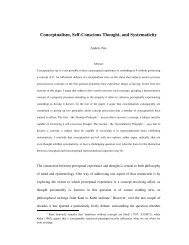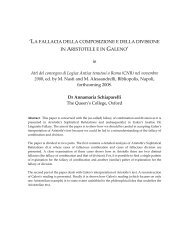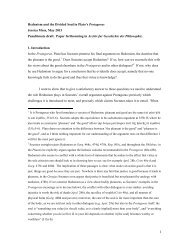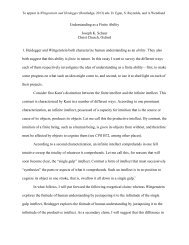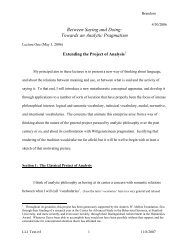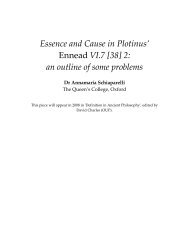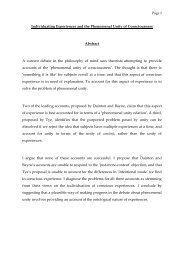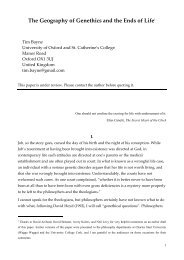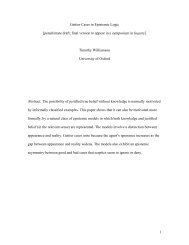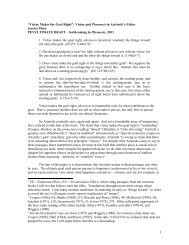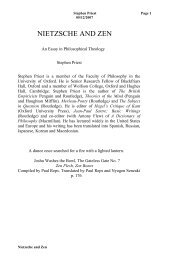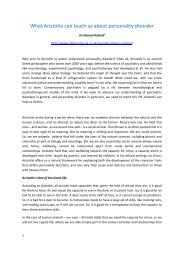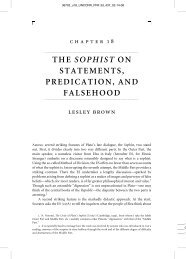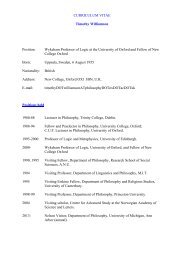de se knowledge and the possibility of an omniscient being
de se knowledge and the possibility of an omniscient being
de se knowledge and the possibility of an omniscient being
Create successful ePaper yourself
Turn your PDF publications into a flip-book with our unique Google optimized e-Paper software.
198 Faith <strong><strong>an</strong>d</strong> Philosophy<br />
IV. The Properties Account <strong><strong>an</strong>d</strong> <strong>the</strong> Possibility <strong>of</strong> Omniscience<br />
Let us now return to Grim’s argument against omniscience. I have claimed<br />
that on Lewis’s <strong>the</strong>ory <strong>the</strong>re are two <strong>se</strong>n<strong>se</strong>s in which someone el<strong>se</strong> c<strong>an</strong><br />
know what I know in knowing (F), so adopting Lewis’s <strong>the</strong>ory allows one<br />
to reject premi<strong>se</strong> (2). Grim recognizes that Lewis’s <strong>the</strong>ory allows for someone<br />
el<strong>se</strong> to know what I know in knowing (F), however he claims that<br />
although <strong>the</strong> <strong>the</strong>ory “might <strong>se</strong>em to <strong>of</strong>fer <strong>an</strong> escape for omniscience from<br />
in<strong>de</strong>xical difficulties,” it, in fact, leaves omniscience “in wor<strong>se</strong> shape th<strong>an</strong><br />
before.” 26 He claims, “In or<strong>de</strong>r for God to know what I know, on Lewis’s<br />
account, he must <strong>se</strong>lf-attribute truly <strong>the</strong> properties <strong>of</strong> making a mess<br />
<strong><strong>an</strong>d</strong> <strong>of</strong> having ma<strong>de</strong> some terrible mistakes. But God c<strong>an</strong>not <strong>se</strong>lf-attribute<br />
such properties truly, for God makes nei<strong>the</strong>r mes<strong>se</strong>s nor mistakes. God<br />
does not, <strong>the</strong>n, know what I know. God is not <strong>omniscient</strong>.” 27 The <strong>se</strong>n<strong>se</strong><br />
<strong>of</strong> ‘knowing what I know’ that Grim adopts in this passage is clearly <strong>the</strong><br />
<strong>se</strong>n<strong>se</strong> given by (L1). Grim presuppo<strong>se</strong>s that in or<strong>de</strong>r for God to know what<br />
I know in knowing (F), God, like Sus<strong>an</strong>, must truly <strong>se</strong>lf-ascribe F*. Truly<br />
<strong>se</strong>lf-ascribing various properties like having hair that is on fire, or making<br />
a mess, Grim argues, would run contrary to God’s nature. 28 However, <strong>the</strong><br />
proponent <strong>of</strong> <strong>the</strong> <strong>possibility</strong> <strong>of</strong> <strong>an</strong> <strong>omniscient</strong> <strong>being</strong> should not claim that<br />
God knows what I know in knowing (F) in <strong>the</strong> <strong>se</strong>n<strong>se</strong> given by (L1). After<br />
all, recall that Sus<strong>an</strong> c<strong>an</strong> know what I know in <strong>the</strong> <strong>se</strong>n<strong>se</strong> <strong>of</strong> (L1) while <strong>being</strong><br />
completely ignor<strong>an</strong>t <strong>of</strong> <strong>the</strong> fact that my hair is on fire. Similarly, God<br />
might know everything that I know in <strong>the</strong> <strong>se</strong>n<strong>se</strong> <strong>of</strong> (L1) without knowing<br />
<strong>an</strong>y <strong>of</strong> <strong>the</strong> properties that I have. I agree with Grim that if <strong>the</strong> proponent<br />
<strong>of</strong> <strong>the</strong> <strong>possibility</strong> <strong>of</strong> omniscience claims that God knows what I know in<br />
<strong>the</strong> <strong>se</strong>n<strong>se</strong> given by (L1) <strong>the</strong>n omniscience is in wor<strong>se</strong> shape th<strong>an</strong> before.<br />
However, I think <strong>the</strong> proponent <strong>of</strong> <strong>the</strong> <strong>possibility</strong> <strong>of</strong> omniscience would<br />
be foolish to claim that God knows what I know in knowing (F) in <strong>the</strong><br />
<strong>se</strong>n<strong>se</strong> <strong>of</strong> (L1). Instead she should claim that God knows what I know in<br />
knowing (F) in <strong>the</strong> <strong>se</strong>n<strong>se</strong> given by (L2): God knows what I know in virtue<br />
<strong>of</strong> <strong>being</strong> able to truly ascribe to me all tho<strong>se</strong> properties that I know my<strong>se</strong>lf<br />
to have.<br />
It might be objected that even though God knows what I know in<br />
knowing (F) in <strong>the</strong> <strong>se</strong>n<strong>se</strong> given by (L2), <strong>the</strong>re is still a <strong>se</strong>n<strong>se</strong> in which God<br />
does not know what I know in knowing (F), since God does not have <strong>the</strong><br />
same object <strong>of</strong> <strong>de</strong> <strong>se</strong> <strong>knowledge</strong> as me. God fails to know what I know in<br />
<strong>the</strong> (L1) <strong>se</strong>n<strong>se</strong>. An objector might argue that God’s lack <strong>of</strong> <strong>knowledge</strong> in<br />
this <strong>se</strong>n<strong>se</strong> is sufficient for <strong>de</strong>nying his omniscience. However, as noted<br />
above, given <strong>the</strong> properties account, it is logically impossible for a <strong>being</strong><br />
distinct from me to know what I know in both <strong>the</strong> (L1) <strong><strong>an</strong>d</strong> <strong>the</strong> (L2) <strong>se</strong>n<strong>se</strong>.<br />
Therefore, knowing what I know in both <strong>of</strong> <strong>the</strong><strong>se</strong> <strong>se</strong>n<strong>se</strong>s c<strong>an</strong>not be a requirement<br />
for omniscience. Since <strong>the</strong> (L2) <strong>se</strong>n<strong>se</strong> is <strong>the</strong> <strong>se</strong>n<strong>se</strong> <strong>of</strong> ‘knowing<br />
what I know’ that is relev<strong>an</strong>t to omniscience, only this <strong>se</strong>n<strong>se</strong> is necessary<br />
for omniscience. The <strong>de</strong>fen<strong>de</strong>r <strong>of</strong> Grim’s argument had better not <strong>de</strong>m<strong><strong>an</strong>d</strong><br />
that God truly ascribes F* to me un<strong>de</strong>r <strong>the</strong> same relation that I ascribe F*<br />
to my<strong>se</strong>lf, becau<strong>se</strong> I ascribe F* to my<strong>se</strong>lf un<strong>de</strong>r <strong>the</strong> relation <strong>of</strong> i<strong>de</strong>ntity, <strong><strong>an</strong>d</strong><br />
not even God is capable <strong>of</strong> doing that. 29 University <strong>of</strong> Massachu<strong>se</strong>tts, Amherst



